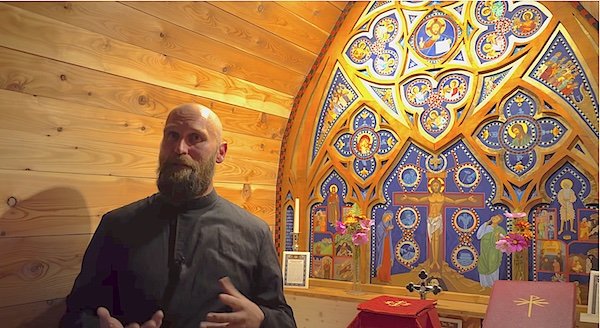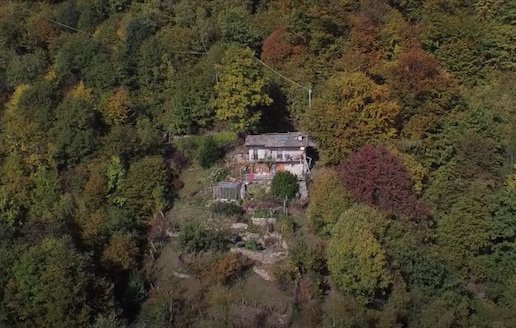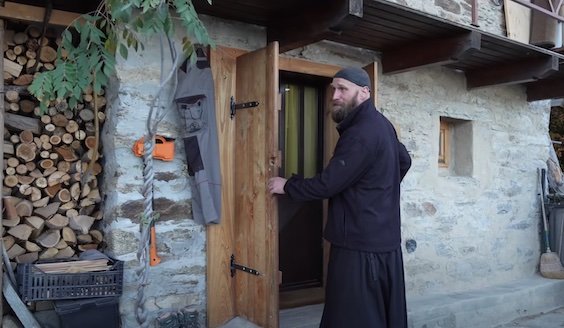Friday Links, December 17, 2021
+ Katy Carl’s 12/13 interview about her new novel is viewable on YouTube.
+ In another YouTube video, a part-time hermit part-time trekker shows off a tiny hermitage he built with a beautiful chapel and decorated in the Italian alps.
+ Reveling in unfinished conversion journeys.
+ A novella of how daily life radically changed for Catholics after the Chinese Communist Revolution and how the faith survived in one man’s heart
As Earth Without Water: An Evening with Novelist Katy Carl
In case you missed this event, which took place December 13, or want to enjoy it again, you can watch Katy Carl, Dappled Things editor-in-chief, read from and discuss the text with Joshua Hren, editor-in-chief of Wiseblood books, publisher of her novel.
Young priest turns forsaken farm into paradise homestead
Rhonda Ortiz shared the above link, uCatholic priest Fr. Johannes M. Schwarz from the Archdiocese of Vaduz, Liechtenstein, shows a YouTube filmmaker couple and their children around the tiny hermitage he bought and fixed up in the Italian Alps. With the permission of his bishop, he’s been there five years, living as a “part-time hermit,”where he works doing editing work. And he also takes long treks and makes films about them. “To Where God Dwells” documents 5,000 miles of a 8,700 mile walking pilgrimage from Central Europe to Jerusalem and back. Via Alpina Sacra shows Fr. Schwarzs’ walking pilgrimage across eight countries and an entire mountain range “in search of its holy sites.”
How does he find the time?
“Liechtenstein) has many more priests than parishes, which makes it easier for the bishop to allow me to pursue life in a hermitage and going for ‘extra long walks.’ Other than that, there is an actual provision in Canon law (§603) that properly regulates and recognizes diocesan hermits.”
What I learned from asking strangers about their spiritual journeys
Natalie Morrill, DT fiction editor, introduced the above linked essay by Marie Trotter at Broadview this way, “Worthwhile reflection on the ‘incompleteness’ of people's accounts of their own spiritual journeys compared with straightforward conversation narratives.” Katy Carl, and Michael Rennier, web editor, Liked this too.
“In my late teens, when I reaffirmed my Catholic faith, I devoured The Road to Damascus. This now out-of-print essay collection featured stories from famous 20th-century Catholic converts like Evelyn Waugh and Clare Boothe Luce, and I loved them for their decisiveness. Converts often write with such confidence because they speak from the mountaintop, surveying the path behind them as if they’ve already reached the finish line.
Over time, though, I outgrew the conversion narrative as a genre.”
How about you? Do you prefer definitive stories to the kind of messy, unfinished journeys that Trotter now prefers, stories of journeys that lack an ending, a resolution or a moral?
‘Christmas Blossoms’ Is a Tale of Hope Amid Hardship
After reviewing Church Militant: Bishop Kung and Catholic Resistance in Communist Shanghai in 2011 by Jesuit historian Paul P. Mariani (son of poet Paul Mariani), I have been following the oppression of Chinese Catholics after the Communist takeover with a sympathetic heart. So this novella by Priscilla Smith McCaffrey caught my eye. (Sophia Institute Press, 2021.)
“This tale of Zhang Jian gives readers a glimpse of how daily life radically changed for the faithful after the Communist Revolution and yet how, despite oppression, Christmas continues to stir hearts.
“As Cardinal Joseph Zen, bishop emeritus of Hong Kong, noted in an editorial review, ‘In this charming novel we are reminded of the flavor of Christmas even during so difficult times, like the ones of the Cultural Revolution in China. We have always to look at the Lord, even when we are in deep trouble. He is our strength and our hope.’”
It is delicately illustrated by Gwyneth Thompson-Briggs, a painter in the Western sacred art tradition.






